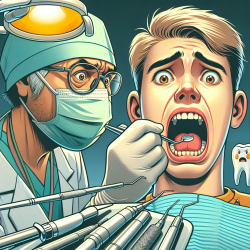In the realm of dental care, understanding patient experiences is crucial for improving treatment outcomes and patient satisfaction. A recent study titled "Patient-reported negative experiences related to caries and its treatment among Swedish adult patients" sheds light on the challenges faced by individuals with active caries and offers insights that can help practitioners enhance their skills and approaches.
The Study: Key Findings
The research conducted at a public dental service clinic in Sweden involved 134 caries-active (CA) and 40 caries-inactive (CI) adult patients. The study aimed to measure patient-reported attitudes and negative experiences related to caries and dental treatment. A questionnaire was used to gather data on oral health perceptions, attitudes towards caries prevention, and negative experiences during dental treatments.
The results were revealing:
- CA patients reported significantly more problems related to caries and dental treatment compared to CI patients.
- They received more information about caries but also reported more negative treatment experiences.
- Negative emotions such as fear, stress, and anxiety were prevalent among CA patients.
- Many CA patients felt they were treated condescendingly by dental staff.
Implications for Dental Practitioners
The findings highlight several areas where dental practitioners can focus their efforts to improve patient care:
1. Enhance Communication
While CA patients received more information about caries, the quality of communication needs improvement. Practitioners should ensure that information is clear, empathetic, and tailored to individual needs. Building a rapport with patients can help alleviate anxiety and foster trust.
2. Address Negative Emotions
The prevalence of negative emotions among CA patients suggests a need for practitioners to adopt a more compassionate approach. Techniques such as cognitive-behavioral strategies or relaxation techniques could be integrated into practice to help manage patient anxiety.
3. Improve Staff Attitudes
The perception of being treated condescendingly indicates a gap in staff-patient interactions. Training programs focused on empathy, active listening, and respectful communication can help bridge this gap and enhance patient satisfaction.
4. Focus on Prophylaxis Methods
The study concludes that improved caries prophylaxis methods are essential for reducing negative experiences. Practitioners should stay informed about the latest evidence-based preventive strategies and incorporate them into their practice.
A Call for Further Research
This study underscores the need for further research into patient experiences with caries treatment. Understanding the nuances of these experiences can lead to better-targeted interventions and improved care outcomes. Dental professionals are encouraged to explore additional studies and collaborate on international research efforts to develop best practices in caries management.
To read the original research paper, please follow this link: Patient-reported negative experiences related to caries and its treatment among Swedish adult patients.










